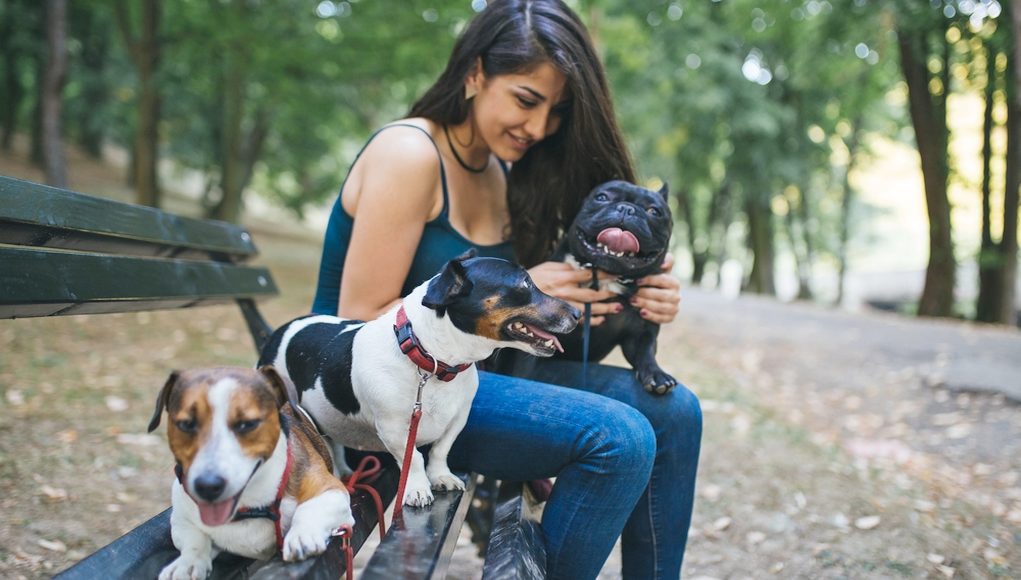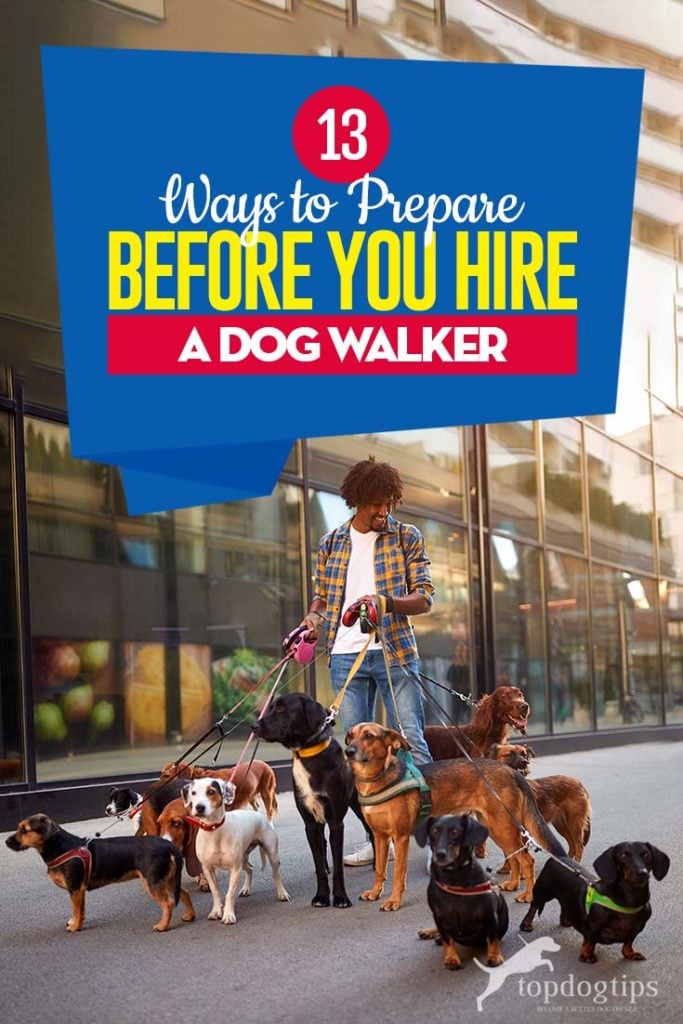You need to leave and cannot take your pet with you. Boarding kennels are expensive and may even carry diseases. If family, friends cannot take care of your pup for a time being, you may need to hire a dog walker. Before you do, however, make sure you're prepared.
1. Find the Right Dog Walker
You want to make sure the dog walker and your pooch are a good fit. References from friends, neighbors, veterinarians or family is a good way to find a reliable dog walker, someone people have already worked with and trust.
Search online for pet sitting services in your area: “dog walker near me“. Some will have reviews on Yelp or Google, others will be reviewed on dog forums or Reddit. Read that.
Check out National Association of Professional Pet Sitters and Pet Sitters International, which are the two reputable agencies in the U.S. that you can contact to find a pet sitter.
Use online dog walking services like Rover, Bark and Wag Walking where you can get thorough details about each dog walker, services offered, reviews and more:
Look through Yelp and Thumbtack. Search for “Top Best Dog Walkers” or similar queries, and they'll come up with reviews. You'll find lists like this one and this one.
2. Interview All Potential Dog Walkers
After you found several dog walkers that look like good candidates – interview them. With most, you'll have to do this over email or phone, but with some (especially when hiring through references), you can meet face to face.
Ask a dog walker about past experience, both positive and negative, what kind of dogs they cared for before, what's their approach to the job, how long they've done this, etc.
Ask if the dog walker had any special training (and for proof if there is any) or how they got into this profession. If your pet has any special needs or odd behaviors, make sure the sitter knows how to properly handle those situations.
Ask about a dog walker's insurance. They should have written commercial liability insurance and be bonded to protect against theft and accidents. Most dog walkers will be honest, and you will not have any issues with this, but it's best to play it safe, so ask.
Ask about their general pay rate. Then, ask about any hidden costs, payment for any extra service or unexpected expenses. Budget for and set up compensation should anything happens. Write down the amount you agree to pay the sitter before hiring.
Finally, don’t be afraid to turn down a dog walker, and be prepared to be turned down yourself by them. This happens often when the relationship doesn't seem to be a good fit. If you have any feelings of uneasiness with that person, go with your gut and hire someone else – there's always a lot of choices.
3. Check Your Dog Walker's References (or Reviews)
After you interview and talk with your potential dog walker, they will always provide you with a list of references (or point you towards online reviews). Reference list will include past clients, which you should use – contact at least a few.
When talking to past clients, ask questions about any problems that arose, unexpected extra payments they had to make, and how a dog walker treated client's home and pet. The more you know, the more piece of mind you'll have when your pooch is in someone else's hands.
4. Allow Your Pet to Meet a Dog Walker Beforehand
Once you decide to hire a dog walker that you're comfortable with, ideally, your pup should have a chance to meet beforehand. This is especially important if you're hiring for more than one day where your pet will spend a long time with that person.
While you may be comfortable with the dog walker, some dogs will not fare well with a stranger entering their home when you’re away, or simply will not accept that person. This will cause problems to your dog walker and, subsequently, to you.
Give it some time to allow your pooch to become comfortable with the pet sitter. If necessary and when hiring for a long-term period, have them meet on multiple occasions. This may seem tedious, but in some cases, it's unavoidable if you want to prevent future problems.
5. Set Up Reliable Contact Information
Both you and the dog walker should have multiple ways to contact each other: two different emails and two different phone numbers. This will prevent anything blocking communication between the two of you, especially in case of accidents.
Explain to your dog walker how often you expect to be contacted, or when you plan to contact them to check in on your pet.
You have a choice to tell your dog walker if you want to be contacted multiple times per day, with pictures and updates on your dog, or if you’re fine with a simple daily rundown.
In addition, set up an emergency contact between the dog walker and your friend or family member. If a pet sitter is having a hard time reaching you, they can simply each out to the other person if need be.
Make sure the dog walker has your veterinarian's contact information in case their services are needed. Let your vet know that your pet will be with a sitter, so they know not to be alarmed if someone new brings your dog in. You can also provide the dog walker with contacts of local emergency vet clinics or anything else you find helpful.
6. Keep All Dog Supplies in One Easy-to-Find Place
When you are preparing your home for a dog walker, leave all important pet supplies you expect to be used in an easily accessible and easy to find spot.
Dog food, treats, leashes, collars, medications, first aid kit and anything else should go all together to ensure the sitter can quickly and easily find anything they need. Print and leave a list of important contact numbers in that same spot as well.
Remember that even you hire dog walker, your pup will be alone in the house at some point. Thus, all the supplies should be somewhere where the pet cannot access them. Food, treats, and medications in particular should be completely unreachable.
7. Make Sure All Supplies Work Before Leaving
Double check and confirm that anything a dog walker may need is working and usable:
- Leashes are still intact and not worn down
- Collars still fit your dog and aren't about to be ripped
- Dog food and treat bags are full and not expiring
- All contact information is still relevant and numbers are working
- First aid kit is packed as needed
- Your dog's medications are up to date, and there's enough of them
Replace anything that seems it may brake soon or expire. You don’t want to leave on vacation just to receive a call from your dog walker as soon as you enter a hotel, saying that something was defective or your pet's medication is gone.
Confirm for the dog walker that if something breaks or runs out while the dog is in their care, to have them replace it, and that you will compensate them for it when you return.
8. Leave Your Dog Walker with Clear Instructions
Do not expect a dog walker to read your mind and guess what you expect from them. Discuss their job and what their time with your dog will look like beforehand.
Clear and effective communication is the best way to ensure everything goes smoothly and neither you nor the dog walker are disappointed in this arrangement. If there's anything specific and something a dog walker may not expect to do, such as for dogs with special needs or health issues, write down the instructions. Having it all in writing is crucial.
9. Get Your Dog Accustomed to a New Schedule
If you're planning ahead and have the time, think about when the dog walker will be coming in and leaving, and how many times per day. Replicate those times to get your dog accustomed to that specific schedule.
This includes feeding and taking your pup out around the time you expected the dog walker to do so. This will make the transition easy for your dog sitter, your pet and yourself, and decrease any chance of stress or problems for all of you.
10. Reinforce the Dog’s Training Before Leaving
Before you leave your dog with a pet sitter, work with and reinforce your pet's training.
Confirm that your pooch still knows how to walk on a leash, and are potty trained. Double check all the basic, essential obedience commands the dog must know. Make sure that the dog is able to refrain from excessive barking and aggression.
Sometimes, dogs will experience behavior problems when they are alone with a stranger. If you know that may be the case, set up a training session with you, your dog, and the dog walker to ensure the pup responds to the sitter. Remember to pay them for this day.
11. Prepare the Dog Walker for Events That May Occur
When leaving for longer, think what could happen when you're gone. Let the dog walker know of any events in the area or any expected visits. If you expect fireworks going off, you want your pet to be kept stress-free.
Let the dog walker know of any areas your dog should avoid. By the same token, you can recommend spots that your dog loves or that the dog walker may enjoy visiting.
Most pet sitting services and dog walkers will work with you in just about any situation, so don’t be shy in telling them what could possibly happen. The more prepared your dog sitter is, the more safe everyone will be, and have an enjoyable experience.
12. Stock Up on Cleaning Supplies
When your dog is alone in your home, they will likely have accidents: getting into a trash bin, spilling and destroying things, or otherwise making a mess. Most dog walkers will agree to clean up after your pooch while you are gone.
To make it easier for your pet sitter, have plenty of cleaning supplies readily available. Discuss this as a possible issue and confirm that your dog walker is fine with this arrangement. If you're still housebreaking a dog, stock up on puppy pee pads, too.
13. Let the Dog Walker Know About Your Pet's Needs
Every dog is different, so even the most experienced dog walker may not be able to tell what kind of care is best for your individual pet.
Inform them of any behaviors and special needs your dog has. For example, a sitter would benefit knowing if your pooch is more social and prefers attention, or if the dog likes to keep to themselves for the most part.
Your goal is to make sure the dog walker understands exactly the type of pet care you expect from them, and clear communication is key.
READ NEXT: Ask a Dog Walker – How Much Do Dog Walkers Get Paid?














